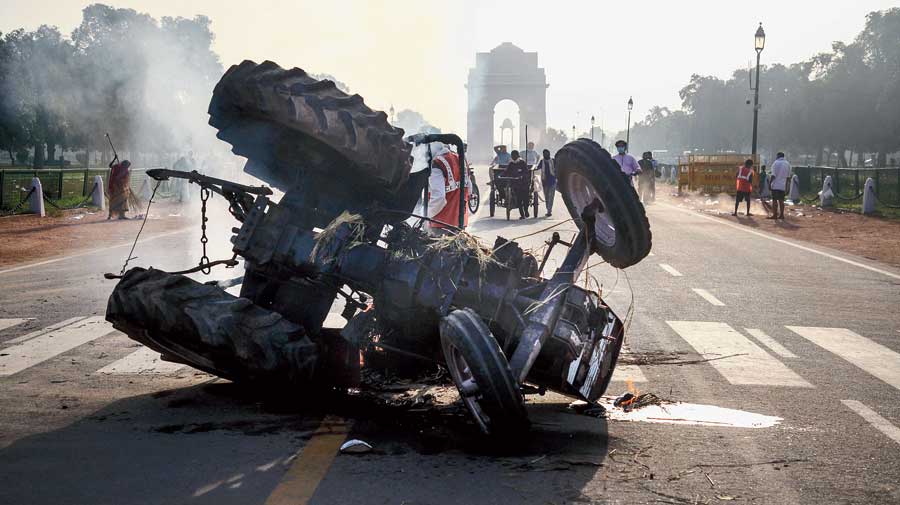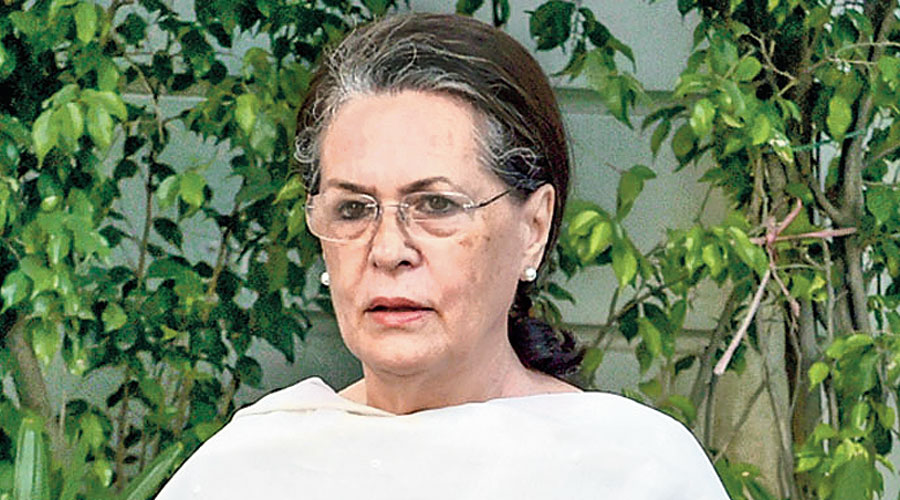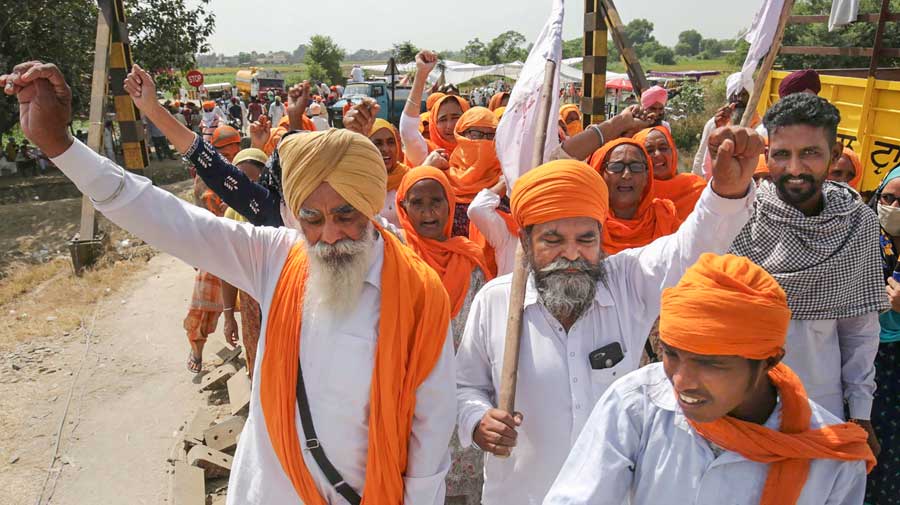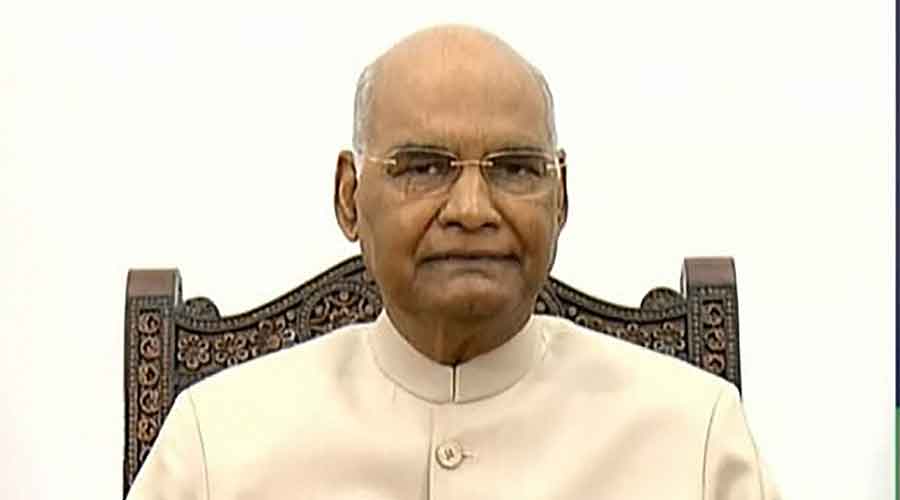Sonia Gandhi has asked states ruled by the Congress to explore the possibility of bringing in legislation to circumvent the contentious farm bills forced through Parliament by the Narendra Modi government, setting the stage for a confrontation on an issue that has brought farmers on the streets and forced the BJP’s oldest ally to snap ties with it.
The party general secretary in charge of organisation, K.C. Venugopal, said in a statement: “Congress president has advised the Congress-ruled states to explore the possibilities to pass laws in their respective states under Article 254(2) of the Constitution which allows the state legislatures to pass a law to negate the anti-agriculture central laws encroaching upon state’s jurisdiction under the Constitution.
“This would enable the states to bypass the unacceptable anti-farmers’ provisions in the three draconian agricultural laws, including the abolition of MSP (minimum support price) and disruption of APMCs in Congress-ruled states. This would also alleviate the farmers from the grave injustice done by the Modi government and BJP.”
Congress chief ministers promptly declared they were ready to take up the challenge.
Article 254(2) of the Constitution says: “Where a law made by the legislature of a state with respect to one of the matters enumerated in the concurrent list contains any provision repugnant to the provisions of an earlier law made by Parliament or an existing law with respect to that matter, then, the law so made by the legislature of such state shall, if it has been reserved for the consideration of the President and has received his assent, prevail in that state: provided that nothing in this clause shall prevent Parliament from enacting at any time any law with respect to the same matter including a law adding to, amending, varying or repealing the law so made by the legislature of the state.”
The Centre clearly enjoys an upper hand, but laws made in Assemblies have been saved through presidential assent in several cases in the past. Because agriculture and trade are state subjects, the Congress hopes this could be a valid option. Even if it does not succeed, by making the attempt the Congress will have sent out a clear message of its intent, which would help it politically.
Punjab chief minister Amarinder Singh led a protest against the farm bills at Bhagat Singh’s village Khatkar Kalan — Monday was the birth anniversary of the freedom fighter hanged by the British — and described the Centre’s move as an attack on federal principles. States and farmers’ unions were not consulted, he said, and declared his willingness to take the path suggested by Sonia.
“Our legal team is working on it. We will decide soon whether to move the Supreme Court or take some legislative measures in the Assembly. But we are not going to leave the farmers at the mercy of these draconian laws. We will fight this menace of the government of India,” he said.

A tractor that was set on fire near India Gate during a protest in New Delhi on Monday against the new farm laws. PTI
Protests against the farm bills have been the loudest in the agrarian states of Punjab and Haryana, but farmers are raising their voice on the streets across the country, prompting even parties friendly to the Modi government, such as the TRS in Telangana and the AIADMK in Tamil Nadu, to speak up for them. The Akali Dal, the BJP’s oldest ally, quit the ruling National Democratic Alliance over the issue.
After the daylong dharna, Amarinder said at a news conference in Chandigarh: “This is not the time for politics. Every party should come together to save the farmers. We don’t want trouble; Punjab has seen enough bloodshed and conflicts. But we will fight this constitutionally and legally. This is not a fight for Punjab. This is a fight for the country’s farmers. India is made of small farmers. This government has no understanding of agriculture. Why are they doing this nonsense – only to make Adani happy?”
He continued: “Farmers will be destroyed as the Centre wants to open the field for the corporate (sector). What will happen to the public distribution system? Grains purchased by Food Corporation of India are given to the poor at a subsidised rate. Will Adani subsidise? You are giving verbal assurances to farmers. Who will trust you when you don’t honour constitutional guarantees? You are not giving GST dues. And what will be left with the states? Where will the revenues come from? How do we run?”
Chhattisgarh chief minister Bhupesh Baghel too declared his intent to challenge the laws in the Supreme Court and to pass a resolution in the Assembly opposing the Centre’s move.
Top lawyers of the Congress are working out the legal responses and will guide the states on future action.
The Congress held protest marches in every state and submitted memorandums to the governors demanding scrapping of the new farm laws, which Rahul Gandhi had described as a “death warrant” on farmers.
In Uttar Pradesh and Delhi, Congress workers were not allowed to organise rallies and hundreds were arrested. Youth Congress activists from Punjab created a ripple when they burnt a tractor near India Gate in Delhi.












